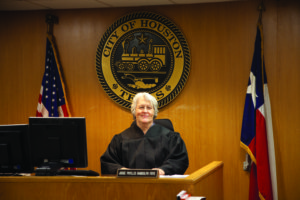 In 2010, Phyllis Frye became one of the first two openly transgender judges in the United States. She currently serves as an Associate Judge for the City of Houston Municipal Courts.
In 2010, Phyllis Frye became one of the first two openly transgender judges in the United States. She currently serves as an Associate Judge for the City of Houston Municipal Courts.
Phyllis was born around 1946, a time of very rigid gender roles. She didn’t understand why her body didn’t match her brain, why she wanted to be in the Girl Scouts instead of the Boy Scouts, why she wanted to wear dresses. And she thought she was the only person who had these types of feelings. As a teenager, she got caught trying on her mother’s dresses, but covered it up with lies.
In college, she married a woman and they had a son, and Phyllis later joined the Army. She continued to dress in women’s clothes in secret, until her wife caught her. She underwent numerous therapies that didn’t “cure” her, and Phyllis’s wife eventually divorced her. She got kicked out the Army and tried to commit suicide.
In 1972, Phyllis got married again to Trish, who accepted her crossdressing, and they moved to Houston. Phyllis kept getting fired from engineering jobs after bosses found out about her secret life. It wasn’t until 1976 that Phyllis came out as “transgenderist,” with the support of wife Trish. (The word transgender wasn’t commonly used yet.) Phyllis and Trish had to deal with the fallout: their tires were slashed and obscenities were spray painted on their driveway. They were ostracized by friends and neighbors.
In Houston, at that time, cross-dressing was actually illegal. Phyllis spent four years lobbying against the law, which was repealed in 1980. Phyllis decided to become a lawyer, so she would have “the tools to defend myself against all the crap that was dished my way.” She studied law at the University of Houston, my alma mater.
While at UH, she founded Law Students and Friends of Gays and Lesbians*, with the asterisk at the end meaning the group was inclusive. She also tried to join the Christian Law Society, but they wouldn’t accept her. They started to meet in secret so she couldn’t attend their meetings. Phyllis wrote to the dean of students to complain, and after an investigation, the university suspended the CLS for discrimination.
After graduating in 1981, no law firm would hire her, not even the gay law firms. She sold Amway for five years to make ends meet. She eventually was able to find clients, taking on many transgender clients that other lawyers didn’t want.
At the time, there was an active gay rights movement in the United States, but the LGB didn’t include the letter T. Gay rights groups tried to distance themselves from transgender issues. Phyllis worked within the movement to convince people that homophobia and transphobia are part of the same issue. Now the T is firmly in LGBTQ.
It’s been more than 40 years since Phyllis transitioned, and she is still married to Trish. Besides being a judge, she is a senior partner at Frye, Oaks and Benavidez, and an expert in transgender law.




Leave a Reply